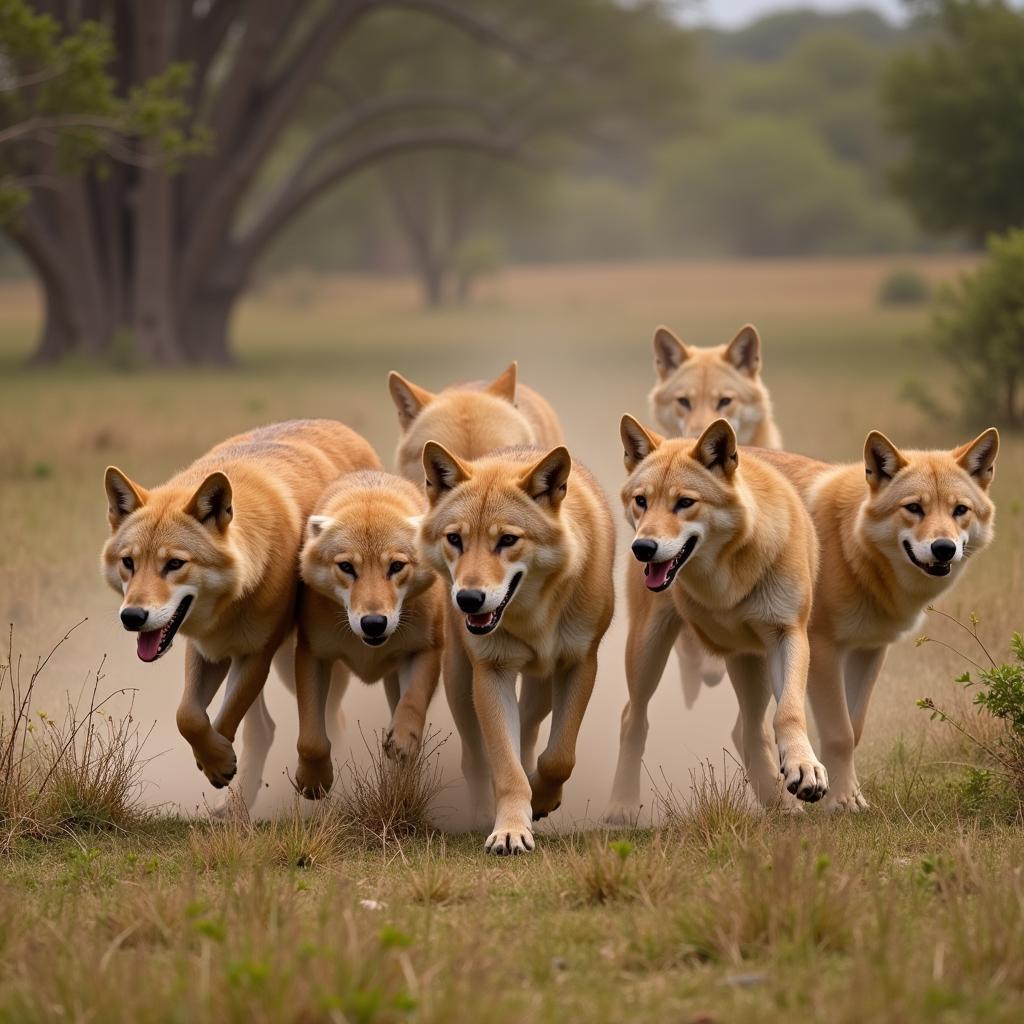The African Golden Wolf Population: A Comprehensive Look
The African golden wolf, once thought to be a jackal subspecies, is now recognized as a distinct and fascinating species. With its striking golden coat and adaptable nature, the African golden wolf roams a vast territory across the African continent. This article delves into the captivating world of the African golden wolf, examining its population status, ecological significance, and the conservation challenges it faces.
Unveiling the African Golden Wolf
The African golden wolf (Canis anthus) is a medium-sized canid, boasting long legs, a bushy tail, and distinctive golden to light brown fur. This elusive predator primarily inhabits savannas, grasslands, and arid regions of Africa, demonstrating a remarkable adaptability to diverse environments.
Understanding African Golden Wolf Population Dynamics
Estimating the precise population size of the African golden wolf proves challenging due to their wide distribution and elusive behavior. However, scientists believe that the overall African Golden Wolf Population is relatively stable, categorized as Least Concern on the IUCN Red List.
Factors Influencing Population Numbers
Several factors contribute to the fluctuation of African golden wolf populations across their range. These include:
- Prey Availability: As opportunistic predators, their numbers are directly linked to the abundance of rodents, hares, birds, and other small animals.
- Habitat Loss: The encroachment of human settlements, agriculture, and infrastructure development into their natural habitats poses a significant threat to their populations.
- Human-Wildlife Conflict: Conflicts with farmers protecting livestock can lead to retaliatory killings, impacting local populations.
The Ecological Role of the African Golden Wolf
As a highly adaptable predator, the African golden wolf plays a vital role in maintaining the balance of their ecosystems.
Keeping Prey Populations in Check
By preying on a variety of small to medium-sized animals, they help regulate prey populations, preventing overgrazing and promoting biodiversity.
Scavenging and Nutrient Cycling
African golden wolves are also efficient scavengers, consuming carcasses and contributing to nutrient cycling within their environment. This scavenging behavior helps maintain a healthy ecosystem by preventing the spread of diseases.
 African Golden Wolf Pack Hunting
African Golden Wolf Pack Hunting
Conservation Efforts and the Future of the Species
While the African golden wolf population remains relatively stable overall, certain regions face localized declines. To ensure their long-term survival, conservation efforts are crucial.
Mitigating Human-Wildlife Conflict
Implementing strategies to reduce conflicts with farmers, such as livestock guarding dogs and improved fencing, can help minimize retaliatory killings and foster coexistence.
Habitat Protection and Restoration
Protecting existing habitats and restoring degraded areas are essential for maintaining healthy populations. This includes establishing protected areas and promoting sustainable land management practices.
Research and Monitoring
Continued research on African golden wolf ecology, population dynamics, and the impact of human activities is crucial for informing effective conservation strategies.
Frequently Asked Questions about African Golden Wolf Populations
1. Are African golden wolves endangered?
Currently, the African golden wolf is categorized as Least Concern on the IUCN Red List, indicating that its population is relatively stable. However, localized declines in certain regions highlight the importance of continued monitoring and conservation efforts.
2. What do African golden wolves eat?
These adaptable canids are opportunistic predators and scavengers. Their diet primarily consists of rodents, hares, birds, reptiles, insects, and occasionally larger prey when hunting in packs. They also play a vital role in consuming carcasses, contributing to nutrient cycling.
3. How do African golden wolves impact their environment?
As apex predators within their ecosystems, they regulate prey populations, preventing overgrazing and promoting biodiversity. Their scavenging activities contribute to a healthy ecosystem by removing carcasses and preventing disease spread.
4. What are the main threats to African golden wolf populations?
Habitat loss due to human expansion, human-wildlife conflict, and disease transmission pose significant threats to their populations.
5. How can I support African golden wolf conservation?
Supporting organizations dedicated to wildlife conservation in Africa, raising awareness about the species and the challenges they face, and advocating for responsible land management practices are all impactful ways to contribute to their conservation.
Need More Information on African Golden Wolves?
For further insights into the captivating world of the African golden wolf, explore these informative resources:
Still Have Questions?
For any inquiries or assistance, please don’t hesitate to contact our dedicated team:
Phone: +255768904061
Email: kaka.mag@gmail.com
Address: Mbarali DC Mawindi, Kangaga, Tanzania
We are available 24/7 to provide support and address your concerns.

